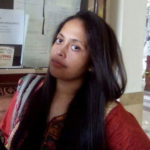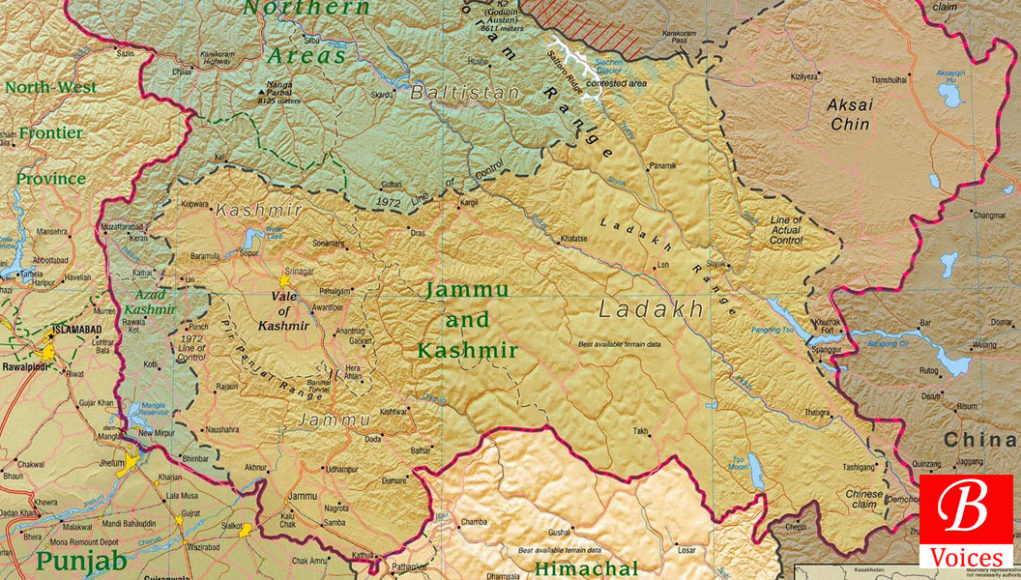 Tahira Khan
Tahira Khan
A couple of weeks before, Department of Political science and Centre for South Asian Studies, University of the Punjab, Lahore conducted a two day national conference on Kashmir issue and the recent warmongering between the corresponding neighboring nuclear states i.e. Pakistan and India. Conference was titled as “Indian Atrocities in Kashmir: Regional and global implications” where scholastic staff was invited from across the country to put intellectual analysis of the issue and resolution in affirmation with the aspirations of Kashmiri people.
The conference was upheld in the aftermath of recent Indian hype and horror campaign which consisted of Modi Balochistan Gambit, Urri attacks, possibility of nuclear war etc. where media, undoubtedly, played a very influential role on both sides. Earlier in South Asian Association for Regional Corporation (SAARC) conference Pakistan presented the issue with well-prepared strategy to end this week long violence in IOK (Indian Occupied Kashmir) and persuaded the Indian counter-part for the need to sit down, at least, in conformity of purposeful dialogue. OIC (Organization of Islamic Conference), also, reflected Pakistani case with affirmation while condemned the Indian actions which are responsible for destabilizing the whole South Asian region. Later on, PM tirelessly advocated the Kashmiri cause in UNGA (United Nations General Assembly) but, the Urri attack turned the whole scenario upside down. The focus shifted from Kashmiri plight to militancy and the notorious possibility of war between Pakistan and India.
During the inaugural ceremony Dr. Hassan Askari Rizvi, Professor Emeritus, University of the Punjab, Lahore, put forward his thoughts regarding the issue. According to him, there are two types of issues being faced by any state i.e. immediate ones and the long term ones. As far as Kashmir is concerned, keeping in view the seriousness of cause, its implications lie in the domain of both these types. On academic behalf, a sound theoretical framework with well based research is needed for the issue. Furthermore, he lamented the Indian propaganda and its strategies which, usually, consist of two phases;
Kashmiri plight doesn’t lies in the terrain of freedom struggle but terrorism only.
Pakistan is, solely, responsible for this uprising and insurgency. So, whenever, we try to put forward this case in the international arena it becomes a subject of Indo-Pak affair only. Kashmiri right of self-determination is, always, given less weightage over the case of two nuclear powers. Thus, the issue, literally, fades out with times and recurring events.
Before moving further, Dr. Kamran Mujahid, Vice Chancellor of PU, was invited to throw some light over the matter. He, first, suggested sending of Mrs. Mishal Malik, wife of Yaseen Malik who is a Kashmiri freedom fighter, to other states, especially, the European ones, to advocate the Kashmiri concerns. Other than that, he announced ten reserved seats for the students of IOK (Indian Occupied Kashmir) in different departments of PU. In the end, he lamented the role and silence of Muslim world over both the Kashmir and Palestinian cause. He said, it was a Jewish scholar who, first, voiced the concerns of Kashmiris in ICJ (International Court of Justice) not any Muslim one. Mrs. Mishal Malik was also present in the conference who, after sometime, expressed her opinion and, deliberately, condemned the Indian brutality.
After that, the conference was formally set opened for the intellectual discourse and research papers in order to resolve the matter and put forward some joint communiqué. It must be noted that, after the era of 1960-70s no research, based on valid reason and good argumentation, has been conducted up till now. Astonishingly, even the UN resolutions regarding the Kashmir issue are known to very few.
In that two day conference, papers were required to be well prepared with systematic reasoning and analytical structure. But, unfortunately, only 5-6 papers were found on the track while others were based on emotions and visceral rhetoric only. This approach looks good on Facebook not in a national conference which needs critical engagement even with words and definitions. Five points were found in, almost, every paper which is mentioned below:
-
Nature of Kashmir freedom movement, its four phases and the dynamic approach of the last phase.
-
Reservations and qualms regarding the Pakistan’s late and immature response and the love of our people for IOK.
-
Denunciation of our media which, according to them, has always played a dubious and hypocrite role.
-
Kashmir issue needs both the regional and global attention as it is correlated to both of them.
-
Last but not the least, we -The Pakistani Nation- is, always, ready for war.
All of them are merely hypothesis consisting of half-truth which can’t compensate for half-falsehood. For every hypothesis, one must formulate some sensible background, then, arguments, facts, analysis etc. Even in Philosophy, idea generates from the heart of facts then how could any academic research is short of such vital thing? Indeed, Papers were focused on absurd discourse and were suffering the results of having cut logic and eloquence.
Randah Smith, the Scanlan Professor of theology, argues, there are only three options when it comes to uncomfortable topics and where in-depth study is required, “Non-judgmentalism, furious indignation or ironic detachment.” These elements were present in many papers.
Yes, the role of media and its structural analysis was effectively presented in some papers. Beyond an iota of doubt, anyone can claim that media houses in Kashmir are playing an instrumental role in exposing the biased and unnecessary narrative while the whole setup behind this cataclysm is put to background by New Delhi based blackguard politicians.
As far as the other aspects of the issue are concerned, no systematic approach was found in any paper. Only one paper was based on the issue of ‘Conflict Management’ which was presented by Dr. Rana Eijaz Ahmed, Assistant Professor, Department of Political Science, who dealt with the subject matter in a more comprehensive way.
Conferences on such indispensable issues like the Kashmir, one needs to be in affirmation with careful analysis and objective judgment devoid of over-generalization, misconstruction, rigidity, common fallacies and narrowness. For any intellectual idea to have a culminative form, we must, at least, examine it for a while to see whether it makes sense or not before going for its presentation.
To all intents and purposes, pellets have been fired in the Kashmiris eyes but instead of them, the international milieu is getting blind day by day. The irony is we are fighting the wrong enemy but the expected calculations for damage would be real, unfortunately.
Writer is a Student of BS (Hons) Political Science, University of the Punjab, Lahore.
Disclaimer: Views expressed in this article are those of the author and Balochistan Voices not necessarily agrees with them.
Share your comments!








